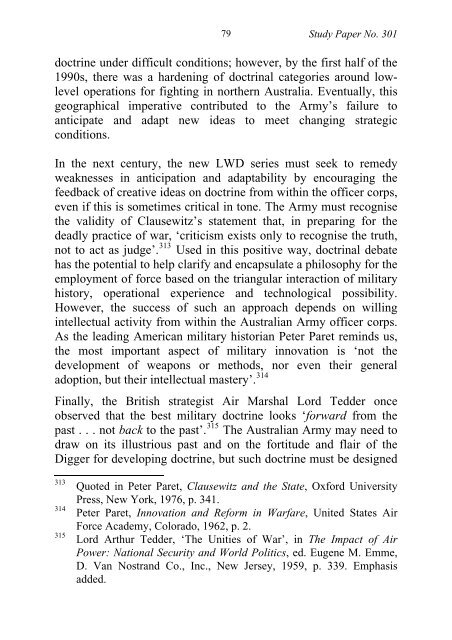Ibid - Australian Army
Ibid - Australian Army
Ibid - Australian Army
You also want an ePaper? Increase the reach of your titles
YUMPU automatically turns print PDFs into web optimized ePapers that Google loves.
79<br />
Study Paper No. 301<br />
doctrine under difficult conditions; however, by the first half of the<br />
1990s, there was a hardening of doctrinal categories around lowlevel<br />
operations for fighting in northern Australia. Eventually, this<br />
geographical imperative contributed to the <strong>Army</strong>’s failure to<br />
anticipate and adapt new ideas to meet changing strategic<br />
conditions.<br />
In the next century, the new LWD series must seek to remedy<br />
weaknesses in anticipation and adaptability by encouraging the<br />
feedback of creative ideas on doctrine from within the officer corps,<br />
even if this is sometimes critical in tone. The <strong>Army</strong> must recognise<br />
the validity of Clausewitz’s statement that, in preparing for the<br />
deadly practice of war, ‘criticism exists only to recognise the truth,<br />
not to act as judge’. 313 Used in this positive way, doctrinal debate<br />
has the potential to help clarify and encapsulate a philosophy for the<br />
employment of force based on the triangular interaction of military<br />
history, operational experience and technological possibility.<br />
However, the success of such an approach depends on willing<br />
intellectual activity from within the <strong>Australian</strong> <strong>Army</strong> officer corps.<br />
As the leading American military historian Peter Paret reminds us,<br />
the most important aspect of military innovation is ‘not the<br />
development of weapons or methods, nor even their general<br />
adoption, but their intellectual mastery’. 314<br />
Finally, the British strategist Air Marshal Lord Tedder once<br />
observed that the best military doctrine looks ‘forward from the<br />
past . . . not back to the past’. 315 The <strong>Australian</strong> <strong>Army</strong> may need to<br />
draw on its illustrious past and on the fortitude and flair of the<br />
Digger for developing doctrine, but such doctrine must be designed<br />
313<br />
314<br />
315<br />
Quoted in Peter Paret, Clausewitz and the State, Oxford University<br />
Press, New York, 1976, p. 341.<br />
Peter Paret, Innovation and Reform in Warfare, United States Air<br />
Force Academy, Colorado, 1962, p. 2.<br />
Lord Arthur Tedder, ‘The Unities of War’, in The Impact of Air<br />
Power: National Security and World Politics, ed. Eugene M. Emme,<br />
D. Van Nostrand Co., Inc., New Jersey, 1959, p. 339. Emphasis<br />
added.

















